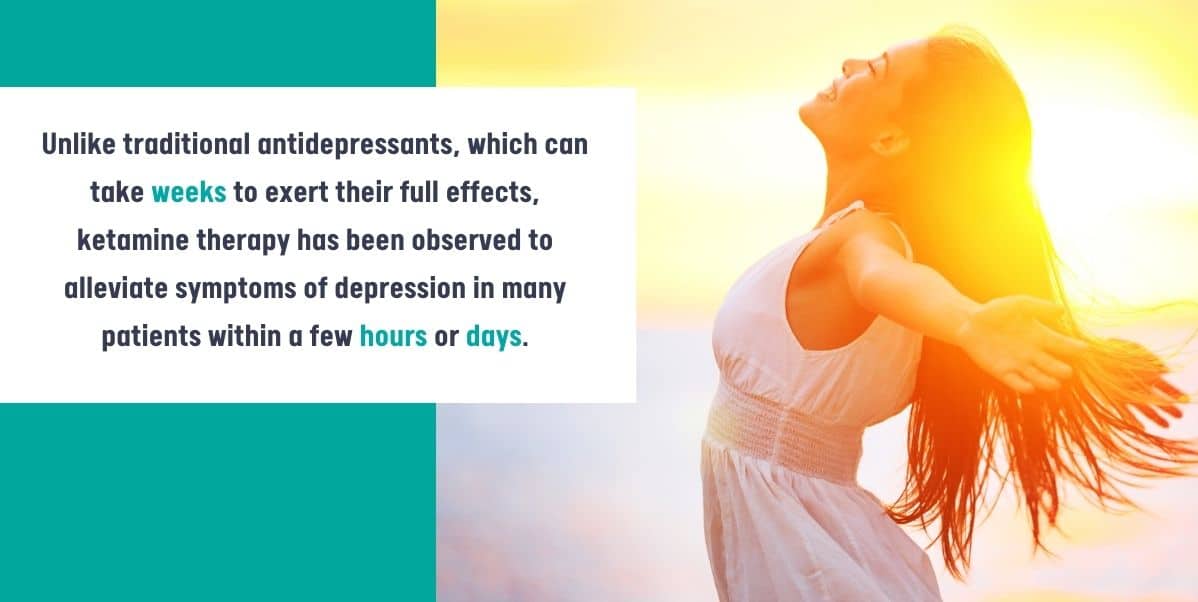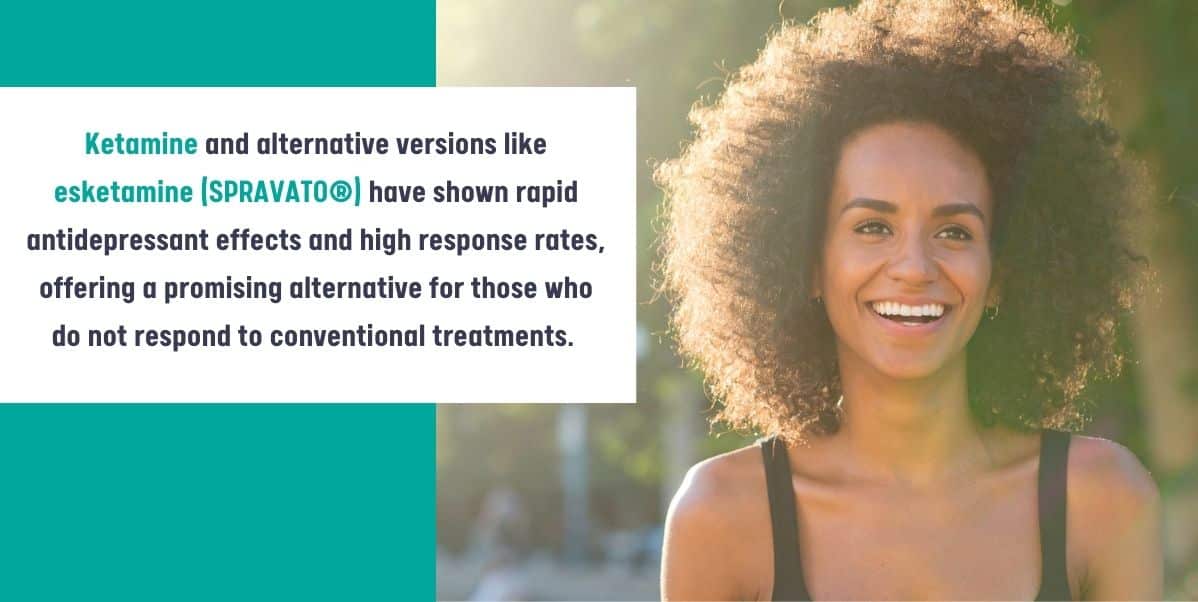
What Are the Long-Term Side Effects of Ketamine for Depression?” This topic has been gaining more attention in recent years as researchers and clinicians explore innovative treatments for depression.
Ketamine, once known primarily as an anesthetic (and, less salubriously, a party drug), is now making waves in the mental health field due to its potential antidepressant effects. But as with any medical treatment, it’s essential to understand the full picture, including potential side effects.
In this article, we will delve deep into the long-term side effects of using ketamine for depression. Whether you’re a medical professional, a patient considering ketamine therapy, or simply someone interested in mental health topics, this article aims to provide comprehensive, up-to-date information on this important topic.
Read on to gain a better understanding of both the potential benefits and risks of ketamine treatment for depression.
Understanding Ketamine
Ketamine, originally developed and approved by the FDA as an anesthetic in the 1960s, has a long history of use in the medical field. It was primarily used for inducing and maintaining anesthesia during surgical procedures due to its unique ability to relieve pain while preserving breathing and consciousness.
In recent years, however, ketamine has garnered attention for its potential off-label use as a treatment for depression. This new application stems from early observations that patients receiving ketamine for other reasons experienced rapid relief from depressive symptoms.
Today, ketamine therapy is increasingly being used to treat severe forms of depression that have not responded to traditional treatments. It’s believed to work by making the brain more malleable and receptive to therapy or alternate ways of thinking.
While promising, it’s essential to understand that ketamine treatment for depression is still a developing field, with ongoing research needed to fully understand its long-term effects.
The Immediate Effects of Ketamine for Depression
Ketamine’s immediate effects on depression are notable for their speed and effectiveness. Unlike traditional antidepressants, which can take weeks to exert their full effects, ketamine therapy has been observed to alleviate symptoms of depression in many patients within a few hours or days.

The exact mechanism by which ketamine exerts its antidepressant effects is still being researched, but it’s believed that the drug alters levels of glutamate, a chemical messenger in the brain. This alteration can result in new neural connections, potentially changing negative thought patterns associated with depression.
Moreover, some studies suggest that ketamine could improve memory in depressed patients and ameliorate cognitive flexibility deficits, providing further benefits beyond mood enhancement.
However, it’s important to note that the following immediate side effects have been reported in patients using ketamine for depression management and treatment:
- Dissociation
- Intoxication
- Sedation
- High blood pressure
- Dizziness
- Headache
- Blurred vision
- Anxiety
- Nausea
These immediate side effects are usually mild and last only a few hours, but they underscore the importance of medical supervision during ketamine therapy.
Long-Term Side Effects of Ketamine for Depression
As we delve deeper into the potential long-term side effects of ketamine for depression, it’s crucial to remember that research in this area is ongoing. While the immediate benefits of ketamine therapy can be profound, understanding the potential risks and side effects associated with long-term use is equally important.
- Cognitive Impairment: Prolonged use of ketamine can potentially lead to cognitive impairment. Heavy ketamine users show deficits in verbal, short-term memory, and visual memory.
- Bladder Problems: Long-term ketamine use has been associated with serious bladder problems, including cystitis and incontinence. This is more common in those who misuse or abuse the drug, but anyone considering ketamine therapy should be aware of these potential issues.
- Addiction: While ketamine is not considered physically addictive in the same way opioids are, it can be psychologically addictive. Some individuals may develop a dependence on the drug, particularly if they have a history of addiction.
- Psychiatric Symptoms: Some patients have reported experiencing psychiatric symptoms such as hallucinations or panic attacks after long-term use of ketamine.
- Physical Health Risks: High doses of ketamine over the long term can potentially lead to increased heart rate and blood pressure, posing risks for individuals with cardiovascular disease.
While these side effects can be concerning, it’s important to note that most studies reporting these effects involve heavy recreational use of ketamine, not controlled medical use. More research is needed to understand the long-term effects of medically supervised ketamine therapy for depression.
Comparing Ketamine Side Effects With Other Depression Treatments
Ketamine has been found effective in treatment-resistant depression, with the primary side effect being transient dissociation at the time of treatment. This is in stark contrast to common side effects of traditional antidepressants, such as selective serotonin reuptake inhibitors (SSRIs), which can include weight gain, sexual dysfunction, and emotional blunting.
While ketamine can cause acute, mild, and transient dissociation, other treatments like SSRIs and serotonin and norepinephrine reuptake inhibitors (SNRIs) may lead to persistent side effects such as sleep disturbances, gastrointestinal issues, and withdrawal symptoms upon discontinuation.

In terms of efficacy, ketamine and alternative versions like esketamine (SPRAVATO®) have shown rapid antidepressant effects and high response rates, offering a promising alternative for those who do not respond to conventional treatments. For instance, one study showed that 70% of patients with treatment-resistant depression improved when started on an oral antidepressant and intranasal esketamine.
However, it’s important to note that the long-term effects of ketamine are still being researched. The current understanding suggests that side effects occur more often with ketamine than traditional antidepressants, but they are typically mild and transient.
Get Supervised Esketamine Therapy at My TMS
Professionally supervised esketamine therapy is vital for treating depression because of the drug’s potent and fast-acting effects. At My TMS, we offer SPRAVATO® (esketamine), an FDA-approved medication that is a prescription version of ketamine. This treatment can reactivate existing brain connections and stimulate new ones, potentially alleviating depressive symptoms in a matter of hours or days.
To take the first step towards recovery from medication-resistant depression today, call us at (877) 548-8081 or fill out this contact form to book your appointment. Let’s work together on your journey to well-being.


